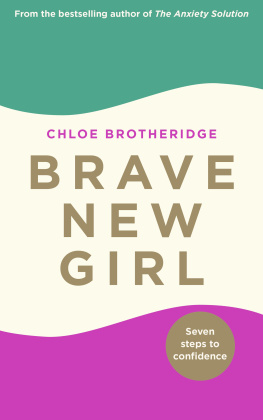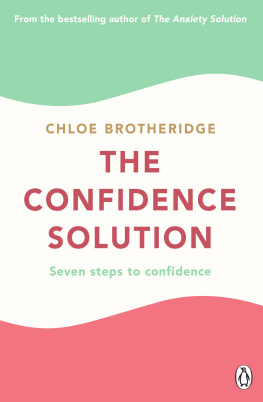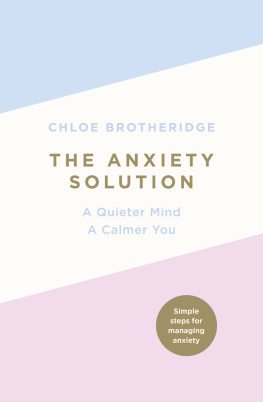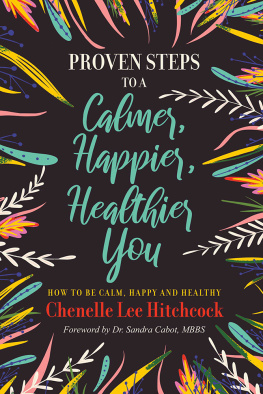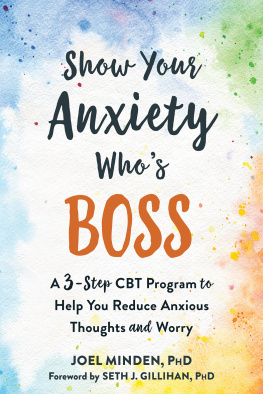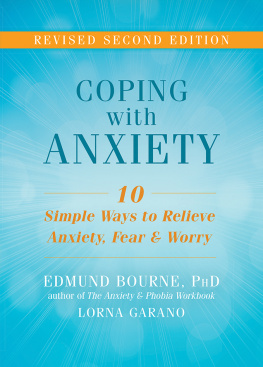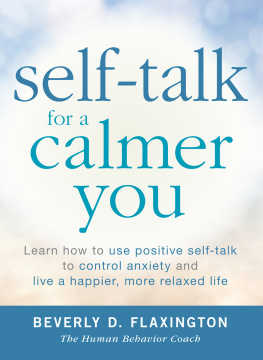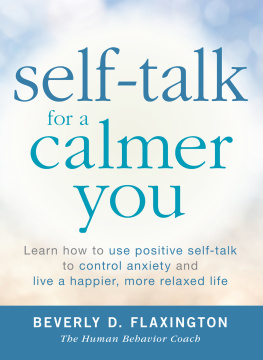About the Author
Chloe Brotheridge BSc, DipH, DipNLP, HC is a clinical hypnotherapist and nutritionist who specialises in helping people who suffer from anxiety. Chloe has her own practice in London and has helped hundreds of sufferers overcome severe anxiety.
Having experienced severe anxiety and panic attacks first hand since her teens, and having found her own path to inner healing, Chloe now feels privileged to be able to share with others the transformative tools and techniques she used herself to achieve a sense of control and inner peace.
Chloe Brotheridge
Brave New Girl
End people pleasing, discover the power of no and become your most confident self


To the brave women reading this book.
MICHAEL JOSEPH
UK | USA | Canada | Ireland | Australia
India | New Zealand | South Africa
Michael Joseph is part of the Penguin Random House group of companies whose addresses can be found at global.penguinrandomhouse.com

First published 2019
Copyright Chloe Brotheridge, 2019
The moral right of the author has been asserted
Part title illustrations: Agne Alesiute
, The Feelings Wheel taken from The Feeling Wheel by Gloria Willcox in The Transactional Analysis Journal, vol. 12, issue 4, (Taylor & Francis, 1 Oct 1982), reprinted by permission of the publisher.
Every effort has been made to trace copyright holders and to obtain their permission for the use of copyright material. The publisher apologizes for any errors or omissions and would be grateful to be notified of any corrections that should be incorporated in future editions of this book.
ISBN: 978-0-241-40046-3
This ebook is copyright material and must not be copied, reproduced, transferred, distributed, leased, licensed or publicly performed or used in any way except as specifically permitted in writing by the publishers, as allowed under the terms and conditions under which it was purchased or as strictly permitted by applicable copyright law. Any unauthorized distribution or use of this text may be a direct infringement of the authors and publishers rights and those responsible may be liable in law accordingly.

Part One
HOW TO START THE CHANGE

CHAPTER 1
Why I wrote this book for women
Despite tremendous strides in reaching equality with men, we all know theres still a way to go. We grew up seeing our mothers and grandmothers doing the majority of the child-rearing, cooking and cleaning. We were raised to be caregivers and nurturers, and given dolls and Sylvanian Families to play with (although we may have been given Lego, too).
Society has different expectations for little girls and little boys. Im generalizing here, but were more likely to be mollycoddled and warned to stay safe. By the way, I by no means want to take away from the struggles that men experience, but the female experience has particular qualities. Many of us have been conditioned into believing the importance of keeping others happy and appearing perfect; a 2016 study by Girl Guiding found that a quarter of girls said they felt under pressure to be perfect. A third said people made them feel as though the way they look is the most important thing about them.
Were taught not to brag, to be modest at all times. How many of us heard dont be a show-off when we were younger? Who still finds it hard to accept a compliment, for fear youll appear big-headed?
Our conditioning goes back generations; parents pass on their fears, doubts and limiting beliefs to their children. And it was only a hundred years three generations ago that women got the vote. When my great-grandmother was born, women were still expected to forgo an education or a career. Even if they worked, the focus was on the domestic sphere and raising children.
In the majority of households its still women who take time off work to raise children (and later, to look after elderly parents) although more men are doing so. And while times are changing, beliefs in society still hang around in our collective subconscious, however equally your parents tried to raise you, or you are trying to raise your children. They include doubts and expectations such as:
- Women shouldnt get angry. They should be agreeable, polite and play nice.
- If a woman is confident, shes bossy or arrogant.
- Cleaning is womens work. A government analysis showed women do 60 per cent more unpaid work (for example, housework, cooking and childcare) than their male partners.
- Women should be the primary carers for children and elderly relatives.
- Women should keep other people happy and put everyone before themselves.
- Women should look good at all times, spend years of their lives, thousands of pounds and stacks of energy on their appearance.
- Women who take care of themselves or say no are selfish.
- Women should be as thin as possible and not take up too much space.
- If a woman is sexually demanding, shes a slut.
- When a woman stands up for herself, shes a bitch.
Youve probably never considered that your confidence might be higher if you were male. But it seems likely. For example, men tend to overestimate their IQ, but women are more likely to underestimate theirs.
What Ive experienced, both in myself and in my clients, is we dont trust our own opinions and we fear failure or criticism, so we play safe or we dont try at all. Were scared to speak up in case we say the wrong thing or hurt peoples feelings. Were less likely to take risks, were more prone to taking criticism to heart. Across our lives women have, on average, consistently lower self-esteem than men. All of this can mean our confidence along with our career prospects takes a knock.
After babies, its more often the woman who returns part-time or to a smaller job, often meaning her career ambitions need to be scaled down, too. Sadly, good girls finish last. At work, not being confident of your value could mean you dont negotiate, charge or value your worth. And women who dont go back to work after children risk losing our identity, building up resentment or ending up burning out because our own needs dont get met.
Theres no denying cultural norms, and the structure of society can be crushing to a womans confidence. But on an individual level, you can decide to break free. And as each of us starts to change, we will be changing things at a collective level, too.
Falling into the beauty trap
As a small girl, I dreamed of having a Disney princess dress. At the age of eleven, I saved for weeks to buy an overpriced hair serum to solve my frizzy hair problem (it didnt) after reading about it in a magazine. I was moisturizing from the age of nine and skipping meals in order to try to achieve a flat stomach at fourteen. All I wanted was a skinny frame like Marissa from The O.C.

